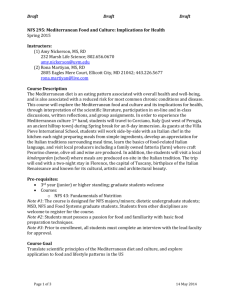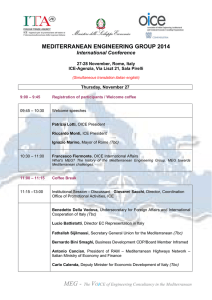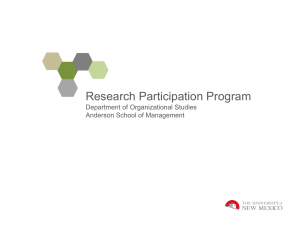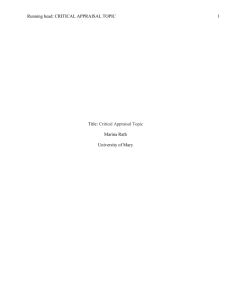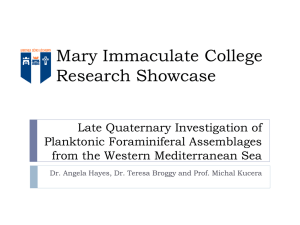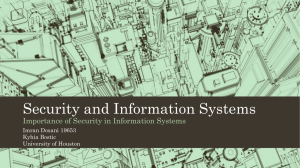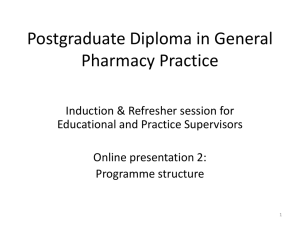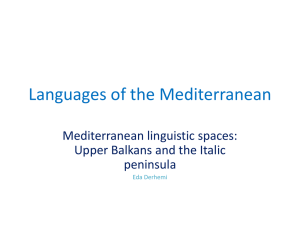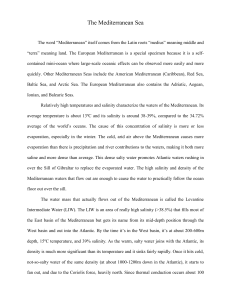Mediterranean Diet and Lifestyle - University of Missouri Extension
advertisement
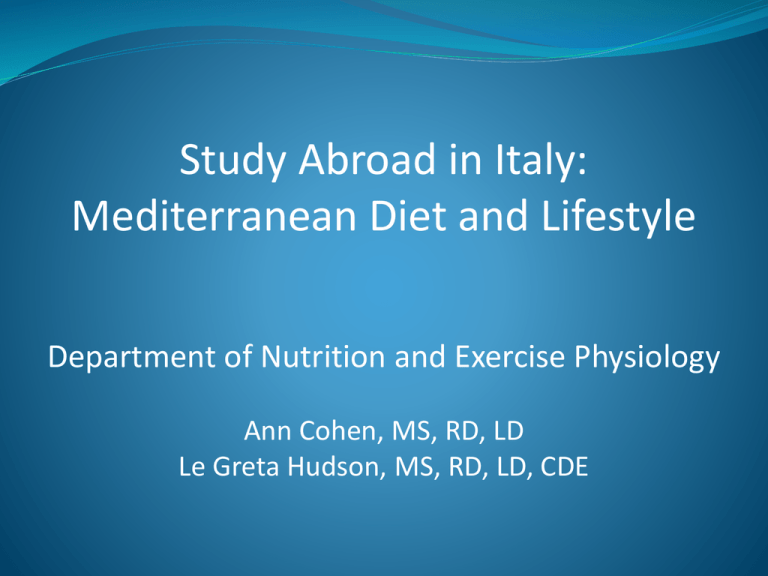
Study Abroad in Italy: Mediterranean Diet and Lifestyle Department of Nutrition and Exercise Physiology Ann Cohen, MS, RD, LD Le Greta Hudson, MS, RD, LD, CDE Mediterranean diet and lifestyle Course credit and topic options Apicius – our partner in Florence Experiences in and around Tuscany Apartments Costs and application Eating experience Small portions Dine leisurely Simple, fresh food After a two year loan to the United States, Michelangelo's David is being returned to Italy His proud sponsors were: Study Abroad in Italy: Mediterranean Diet and Lifestyle May 16 – June 6, 2015 NUTR_S 3131 two sections: Three credits Six credits Program website: http://extension.missouri.edu/hes/studyabroad/ Course objectives: 1. Identify the ways foods are produced, marketed, and consumed in Italy as compared to the U.S. 2. Contrast social, cultural, and environmental influences on food acquisition, storage, and preparation in Italy with those in the U.S. 3. Evaluate public policies and practices related to food, nutrition, and health in Italy as compared to the U.S. Three credits Choose from the following courses taught by Apicius International School of Hospitality in Florence, Italy The Mediterranean Diet: A Guide to Healthy Living Nutrition in the Sports Industry Farm to Table - Sustainable Food Participate in selected class meetings of the Mediterranean Lifestyle: Culture, Policies and Practices course taught in Florence by MU faculty Six credits Mediterranean Lifestyle: Culture, Policies and Practices course taught in Florence by MU faculty and your choice of a course taught by Apicius International School of Hospitality The Mediterranean Diet: A Guide to Healthy Living Nutrition in the Sports Industry Farm to Table - Sustainable Food The Mediterranean Diet: A Guide to Healthy Living Analyze and compare various food guides and elements of each of the food groups Prepare typical Mediterranean dishes Evaluate food choices related to health Nutrition in the Sports Industry Examine how nutrition and exercise can maximize athletic potential and performance. Identify the benefits of exercise for optimal health and weight loss. Evaluate the nutritional aspects of an athlete’s diet (calories, caloric pattern, hydration, daily food distribution, eating timing and digestion). Farm to Table Sustainable Food Explore the social aspects of the food supply chain. Discuss sustainability principles in food systems Examine food availability, accessibility, distribution and consumption Travel To a winery in the Chianti area, to Parma and Modena in the Emilia Romagna region and to the Cinque Terre. To Rome or Venice on May 31. To Lucca and Pisa on June 2. St. Peter’s Square - Rome Expectations Participation in all classes and excursions Class presentations, papers, quizzes and exams in Italy; reflection portfolio on return to US Behavior: Representative of the University of Missouri and guest in Italy Costs Estimated program costs for three credit course Estimated program costs for six credit course Saturday, May 16-Saturday, June 6, 20151 Saturday, May 16-Saturday, June 6, 20151 MU Educational Fees for 3 Credits: $822 MU Information Technology Fees for 3 Credits: $39 MU Human Environmental Sciences Course Fees for 3 Credits: $130 MU Study Abroad Administrative Fee: $75 Early Program Fee2: $3,100 Total Program Costs: $4,166 MU Educational Fees for 6 Credits: $1,644 MU Information Technology Fees for 6 Credits: $78 MU Human Environmental Sciences Course Fees for 6 Credits: $260 MU Study Abroad Administrative Fee: $75 Early Program Fee2: $3,100 Total Program Costs: $5,157 Additional Costs: Round Trip Airfare (estimated):$1,450 Personal Expenses (estimated): $500 Total Additional Costs: $1,950 Additional Costs: Round Trip Airfare (estimated):$1450 Personal Expenses (estimated): $500 Total Additional Costs: $1,950 Final Cost: $6,116 Final Cost: $7,107 1Based on fees for the Fall 2014 semester. Summer 2015 fees may vary. NonMissouri residents pay an additional $500.90 per credit hour. 2Based on receipt of $100 non-refundable deposit by December 12, 2014. Financial Aid Financial aid that is typically available for regular classes at MU should apply to the cost of the program: Curators Scholarship Bright-Flight MU Grant Other MU scholarships Additional grants, loans or scholarships may be available to offset the extra costs incurred on this program. For more information contact the Financial Aid Office at 11 Jesse Hall, 882-7506. Application and Deposit Submit the following application materials to Deb Garrett, 204 Gwynn Hall: Course proposal form Application form Deposit. Non-refundable $100 deposit holds a place in the program. Check payable to University of Missouri. Deposit and forms to Deb Garrett, 204 Gwynn Hall by December 12, 2014 Questions?
